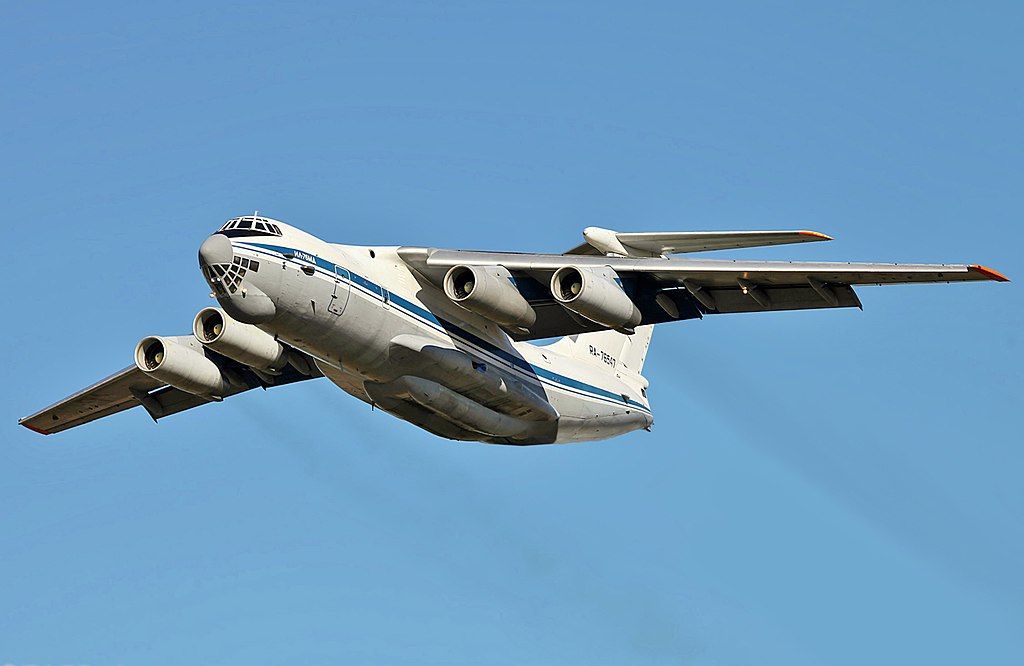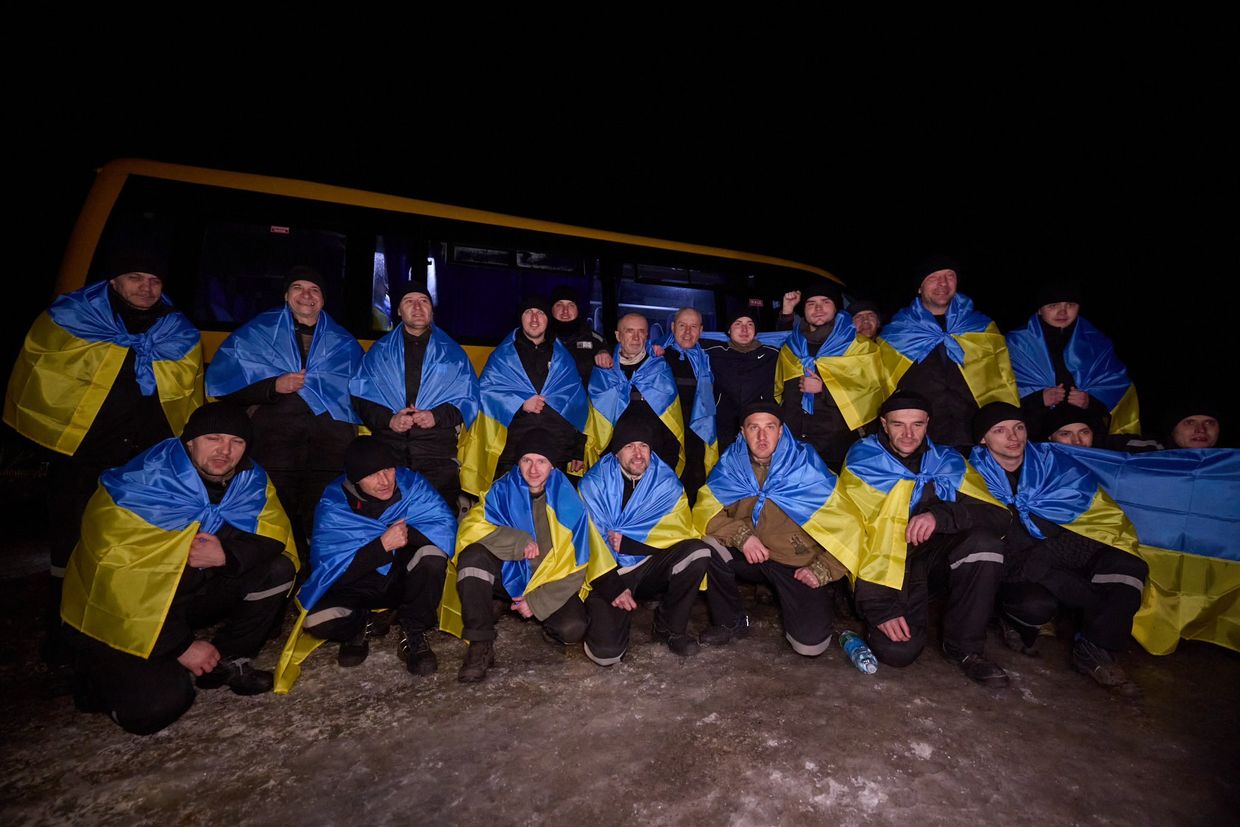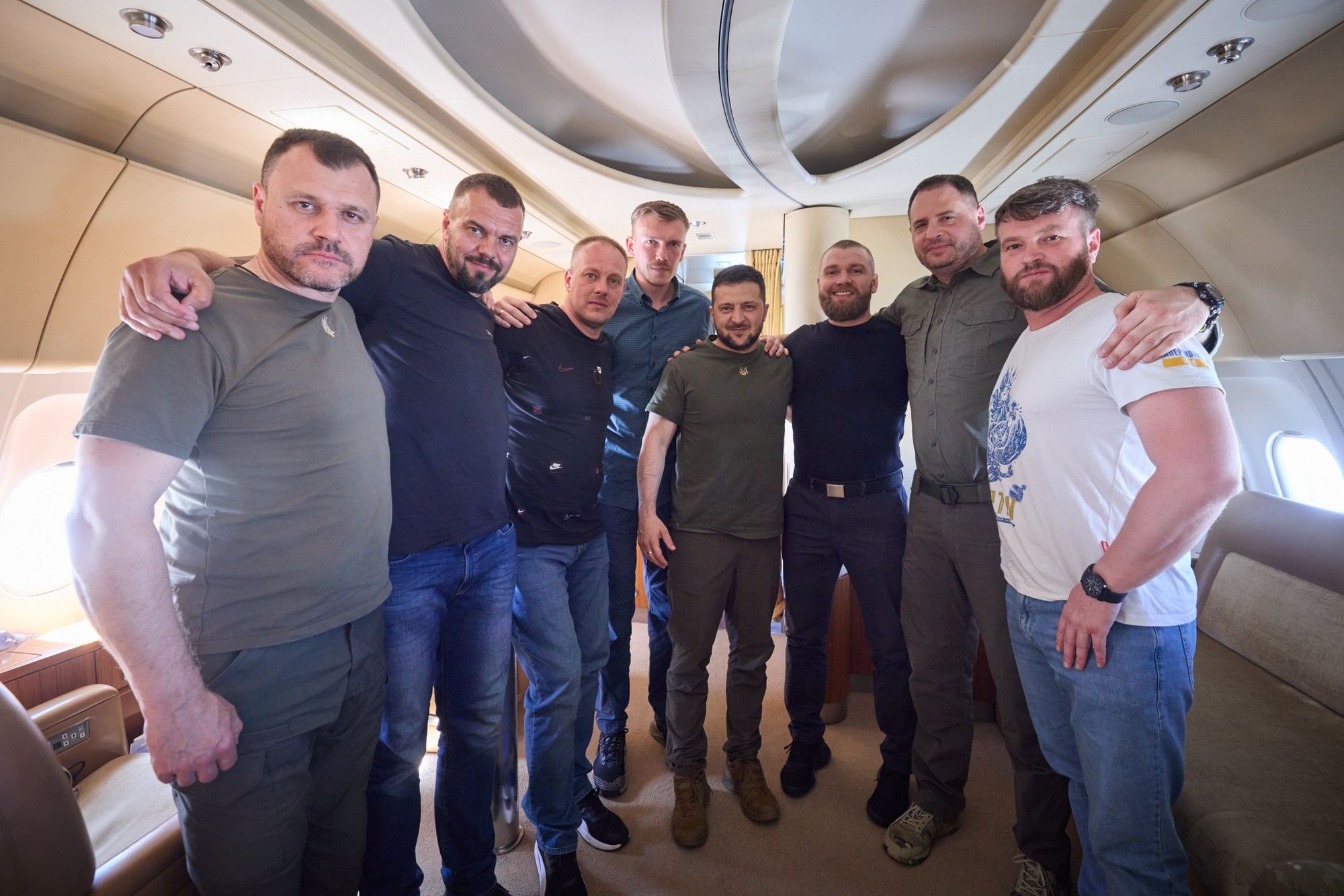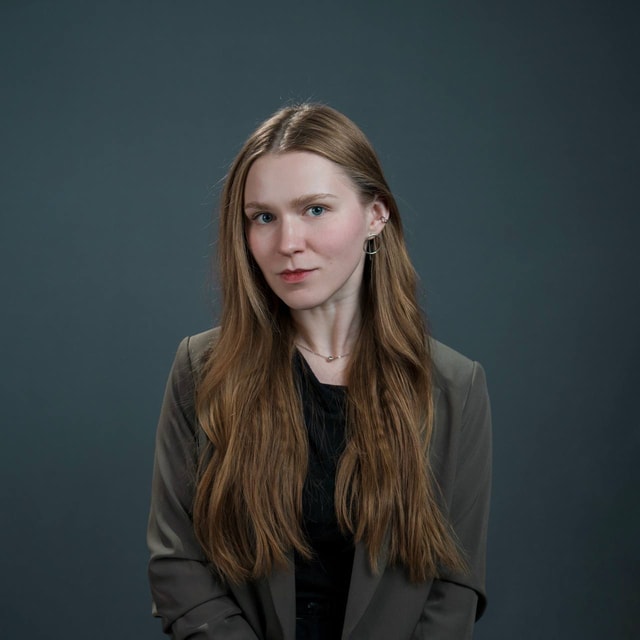Families of captive Azov fighters desperately wait as Russia obstructs prisoner swaps

The last time Natalia Kravtsova heard the voice of her son was on May 18, 2022, two days after he was captured by Russian troops in Mariupol. She has not heard from him since.
Shortly after news broke on Jan. 24 that a Russian Il-76 military transport plane had crashed just north of Belgorod in Russia, the Russian authorities alleged that 65 Ukrainian prisoners of war had been on board and that they had all been killed.
While Ukraine did not confirm that prisoners are onboard, it later emerged from Ukraine's Main Intelligence Directorate, known by its Ukrainian acronym HUR, that an exchange of prisoners had indeed been planned for that day.
That night, President Volodymyr Zelensky, in his evening address, accused Russia of using prisoners of war to cause additional pain to those waiting for their loved ones to return home from captivity.
"It's clear that the Russians are playing with the lives of Ukrainian prisoners, the feelings of their loved ones, and the emotions of our society," Zelensky said.
The news had indeed jabbed at a sore point that is little talked of in Ukrainian society – the painful wait by the relatives of the thousands of Ukrainian soldiers thought to be in Russian captivity for the return of their loved ones or even just for news whether they are alive.

"This is a horrifying experience for us, the relatives," Natalia Kravtsova, the mother of a captured Ukrainian soldier, told the Kyiv Independent just a few days before the Russian Il-76 crashed.
"You're living in a vacuum all this time. It feels like you're frozen and that life is passing you by. You don't see it, don't hear it, don't feel it. All your feelings are focused on getting a very desired call and hearing his words: 'I'm in Ukraine.'"
Silent struggle
Originally from Donetsk Oblast, Kravtsova's son, whose name she does not give for security reasons, had joined the Azov Regiment a year into the all-out war in 2015, serving as a dog handler.
After 86 days of defending the encircled city under heavy bombardment, he and about 2,500 other fighters had left the Azovstal steel plant – their stronghold in the city – after Ukrainian commanders ordered the defending garrison to lay down their arms.
That was two days before his final call home and the start of the count of his days in Russian captivity – as well as the fight for his release.
"He had a nice dog. It searched for mines and explosive devices. The task was to save the lives of civilians and soldiers," Kravtsova said.
"Unfortunately, the dog died in Mariupol. A lot of people died. It was hell on Earth there. But most importantly, my son is alive."
Kravtsova now heads a community of relatives of the Azov fighters who defended Mariupol, which has more than 400 members. The group collects data about prisoners of war and missing soldiers, supports their families, and serves as a bridge between the authorities and society.
It also holds weekly silent rallies in dozens of Ukrainian cities to keep the release of the prisoners on everyone's agenda. One of the latest, in late January on Kontraktova Square in Kyiv, gathered more than a hundred people.
The relatives quietly held up cardboard placards bearing the plea: "Bring my son home. Be their voice. Captivity kills."


The rally in Kyiv brought together not only relatives of captured soldiers but also their brothers-in-arms and concerned ordinary Ukrainians, such as 15-year-old Yaroslav Stetsyk.
"Today, many people are detached from reality, the war we live in," Stetsyk told the Kyiv Independent.
"They don't want to burden themselves with disturbing news. I'm not going to be like that – They fought for us, now we have to fight for them."
Wrapped in a blue and yellow flag, 70-year-old Mykola was one of the relatives at the silent rally. His son was captured 20 months ago, and Mykola hasn't spoken to him since.
"Unfortunately, the exchange is not moving or is moving very slowly," Mykola said.
After being stalled since August 2023, prisoner exchanges resumed in early 2024, with 537 Ukrainian soldiers returning home in a total of three swaps.
Among them, only three were from the Azov Regiment, a unit that still has over 900 of its men and women in Russian captivity, according to Denys Prokopenko, the commander of the Azov Regiment.
Many see it as Russia's deliberate attempt to keep Azov fighters in custody for as long as possible.
Since 2014, Russian propaganda has been exploiting the narrative that Azov fighters are all members of far-right groups, due to their close links to nationalist and football hooligan groups in the early days of the organization’s existence – a story often exploited by Western media outlets in the past.
Long fight
Each swap is a long-awaited moment for families, and is a morale-booster for Ukrainians in general.
But thousands of soldiers remain in captivity – the exact number of prisoners is not even known. Ukraine's Minister of Reintegration of the Temporarily Occupied Territories reported that as of November 2023, the figure exceeded 3,500.
Ukraine's Coordination Headquarters for the Treatment of Prisoners of War said the total number of Ukrainians released is now 3,135.
Military Intelligence Chief Kyrylo Budanov in an interview with Ukrainian media on Jan. 6 called each exchange a "separate operation" and added that Kyiv is using "all available capabilities" to return all the rest.
"Russia is playing its usual game, trying to play a trump card of, so to speak, issues that are socially complex in their understanding in many layers of our population, which include the question of (the) Azov (Regiment)," Budanov said.
He said the largest swap was a "significant result" following claims that Russia had frozen the exchanges since summer 2023.

Petro Yatsenko, the head of the press service of the Coordination Center for the Treatment of POWs, told the Kyiv Independent that Moscow had not canceled the exchanges but constantly found reasons to postpone them, sometimes "at the last moment."
He accuses Russian authorities of manipulating and stalling the prisoner exchange process.
"After several months passed, it became clear that there was a well-thought-out campaign to delay (prisoner exchanges)," Yatsenko said. "We managed to resume (the exchanges) because the Ukrainian side took a proactive stance. Finally, the negotiation process was successful because we found various formulas to make it happen," Yatsenko said.
After the long-awaited and large-scale exchange on Jan. 3, the first in months, Budanov promised to "get everyone out," including the members of the Azov Regiment.
Both prisoner relatives and Ukrainian officials have suggested that by delaying exchanges of POWs, Russia is trying to put pressure on Ukraine and destabilize society.
But Yatsenko assures that the delays in exchanges are not due to the Azov prisoners in particular, and Ukraine aims to release all of its soldiers.
"We in no way divide Ukrainian defenders into different categories and groups," Yatsenko told the Kyiv Independent.
"This is what Russian propaganda does. The process continues, negotiations are ongoing, and we hope for further exchanges."
The United Arab Emirates mediated the last prisoner exchange, and according to President Zelensky, Ukraine wants to engage third parties to bring all of the defenders of Mariupol back.
The punishment of captivity
Meanwhile, the relatives of the Ukrainian soldiers captured at Azovstal in Mariupol continue their long wait. It has lasted more than 600 days now.
Many family members live in limbo, with no information about the POWs' whereabouts, their health, or even whether they are still alive.

Comrades released from captivity sometimes bring news of those still detained, or sometimes relatives catch a glimpse of their loved ones on Russian propaganda sources.
These are usually photos or videos of interrogations.
Adding to the pain is the knowledge that Ukrainian prisoners of war held in the occupied territories of Ukraine or in Russia are systematically mistreated, as confirmed by a UN report, which found that 90% of the hundreds of Ukrainian POWs held by Russia and released in swaps had been tortured.
And despite what Ukrainian officials say, there are suspicions among relatives of captive Azov Regiment soldiers that their loved ones are singled out for particularly harsh treatment and that their return, in particular, is being delayed.
The last major exchange involving Azov troops was in May 2023. A handful have been released since.
Kravtsova echoes those concerns.
"No one deserves such a terrible punishment as captivity," she said.
"The defenders of Mariupol did a lot for Ukraine – they bought us time. The least that society can do is to remember them. We should remember about those who are dead, (also) but not be silent about those who are alive."
"All our men and women must come home sooner or later."














